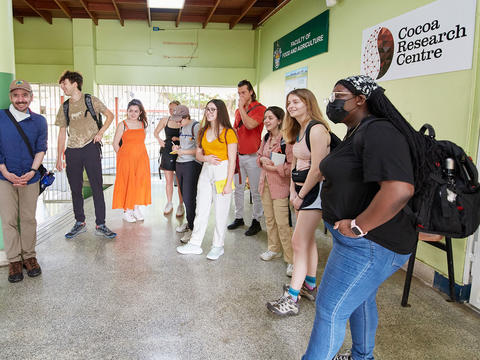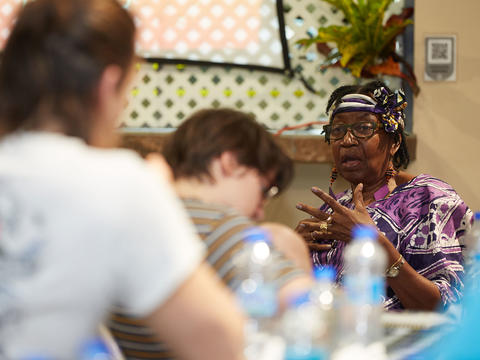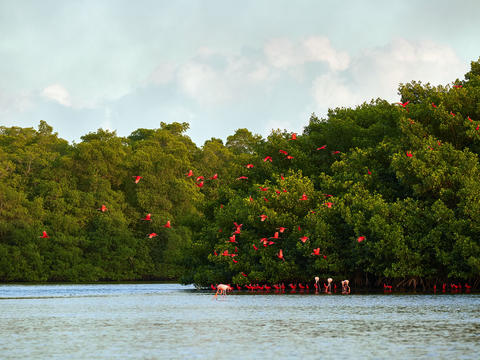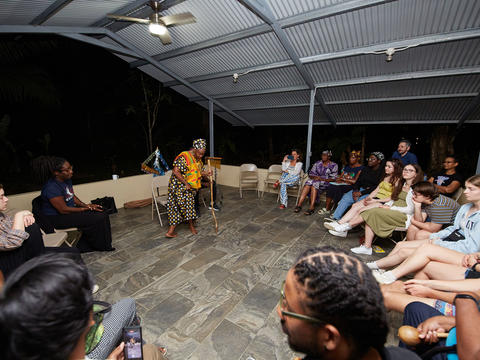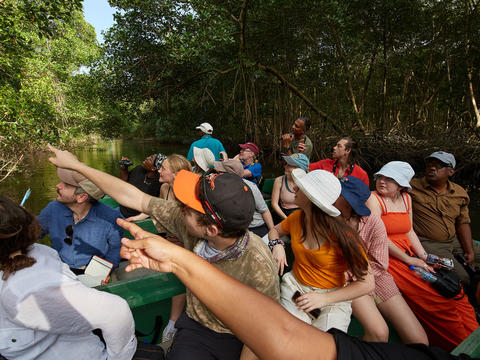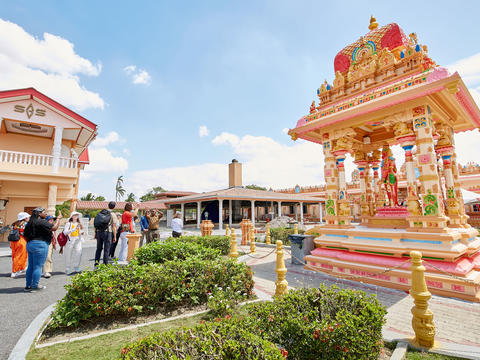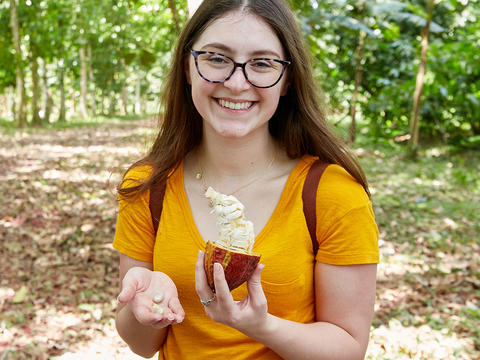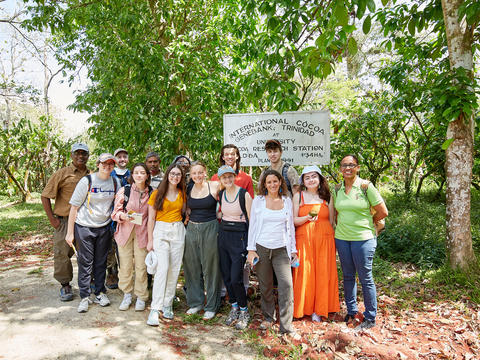A Field Study Trip Explores Trinidad and Tobago
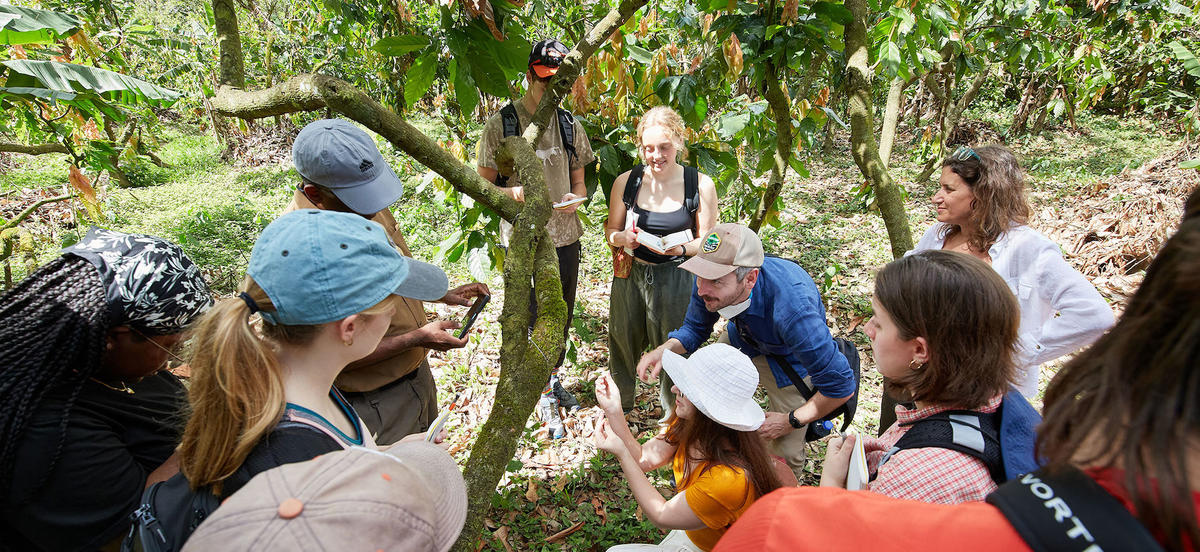
Professor Jon Wilson and students visit the International Cocoa Genebank. Photo: Antony Scully
Details
Over spring break, students from Jonathan Wilson’s Botany class journeyed to the dual-island nation to study its abundant plants, diverse wildlife, and rich culture. This is the fourth year the trip has been offered.
For years, Associate Professor of Environmental Studies Jonathan Wilson pined for a way to animate the connection that plants have to a place’s biological, social, and cultural history. Wilson had been teaching about those connections in many of his courses, but was in the process of developing a new Botany course which explores the fundamentals of plant biology, physiology, and evolution through the lens of agriculturally important plants—everything humans eat, grow, wear, and use. But he longed for a way to extend that learning beyond the classroom and into the world.
Similarly, Stephanie Zukerman wished she could somehow share the rich history, art, and culture of her father’s Trinidad and Tobago homeland with the students she serves as the International Programs manager for the Center for Peace and Global Citizenship (CPGC).
A chance meeting during an on-campus cocktail party in 2016 merged these two visions, resulting in what has now become a regular, spring break, field study trip for students from Wilson’s Botany course to the dual-island country off the coast of Venezuela.
“For the longest time I really wanted to take students to the tropics because when you go to the tropics, plants break all the rules,” says Wilson. “And Stephanie had long been seeking someone to connect a class, particularly an environmental class, with her deep cultural and historical associations with Trinidad and Tobago. With all the connections she had, it quickly became clear that we could create something that was really extraordinary.”
And that they did. This year’s spring break marked the fourth time students from Wilson’s Botany class have had the opportunity to participate in a field study that spans approximately 10 days. Funded primarily by Haverford’s CPGC, the trip took them into towns, rain forests, and even individual homes, and included a visit to a village where cacao is grown and chocolate made. They met with a local woman in her garden where they learned about the islands’ medicinal use of plants and watched traditional Afro-Trinidadian folktales enacted by performance poet and former Poet Laureate of Port of Spain Eintou Pearl Springer and her daughters Attillah and Dara.
“I set up a lot of cultural elements as well,” says Zukerman, who wrote her master’s thesis on the impact of migration on the cultural identities of Trinidadian immigrants in Philadelphia. “So there’s one day dedicated to learning about the East Indian population, and then another day when we do an African legacy tour. I wanted to make sure that the students had that cultural context in a way that’s equally balanced with the natural [science] part.”
This year, as in previous years, students were led by Jason Radix, one of Trinidad and Tobago's best known naturalist guides and an expert on the nearly 450 bird species that inhabit the two islands. “That was something I didn’t expect and was actually really cool,” says David Cole ’23, one of the students on the trip, who was grateful for the chance “to see all these beautifully colored different birds that I had never seen in my life and may never see again.” Observes Cole, “Since I have been back in the States, I notice more of the birds here. It sparked a new interest I didn’t really have before.”
Jessica Korgen ’24, says she really appreciated the hands-on learning the trip provided. “Actually seeing, feeling (and tasting) the plants we read about brought my understanding of the material to a whole new level. I applied for this trip for the plants but walked away with so much more knowledge from other fields than I ever expected. This trip had everything: birds, plants, culture, people, food, fish, beach, forest, swamp. I can’t believe how much we packed into 10 days without it feeling rushed.”
The trip in March was the first since the pandemic. “[In 2020], we were among the last people out of the country before it locked down,” says Wilson. For the first time since then, Zukerman returned to Trinidad and Tobago in January, using part of a family vacation to scout the Haverford trip. That was fortunate, she says, as some of the places they had visited and stayed in during previous trips had shut down entirely in the aftermath of the pandemic.
Says Professor Wilson about the field study, “It's really a beautiful synthesis of science, the environment, culture, and history. It's stuff you can't get from a textbook [or] from a classroom experience. A 30-minute conversation with somebody in the rainforest or in a neighborhood in Port of Spain can change the students' lives. And I'm really proud of that.”
—Sam Donnellon
